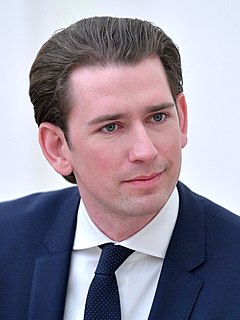A Quote by Sebastian Kurz
I would like to have a Europe that has a strong foreign and defense policy, ensures economic growth and is active in addressing the issues of the refugee crisis. But perhaps not one that imposes new regulations on allergens that requires food menus to be changed everywhere. When that happens, it creates the feeling that the wrong priorities are being set.
Related Quotes
If I were a German today, I would be proud, proud but also worried. I would be proud of the magnificent achievement of rebuilding my country, entrenching democracy and assuming the undoubtedly preponderant position in Europe. But a united Germany can't and won't subordinate its national interests in economic or in foreign policy to those of the Community indefinitely. Germany's new pre-eminence is a fact - and its power is a problem - as much for Germans as for the rest of Europe.































